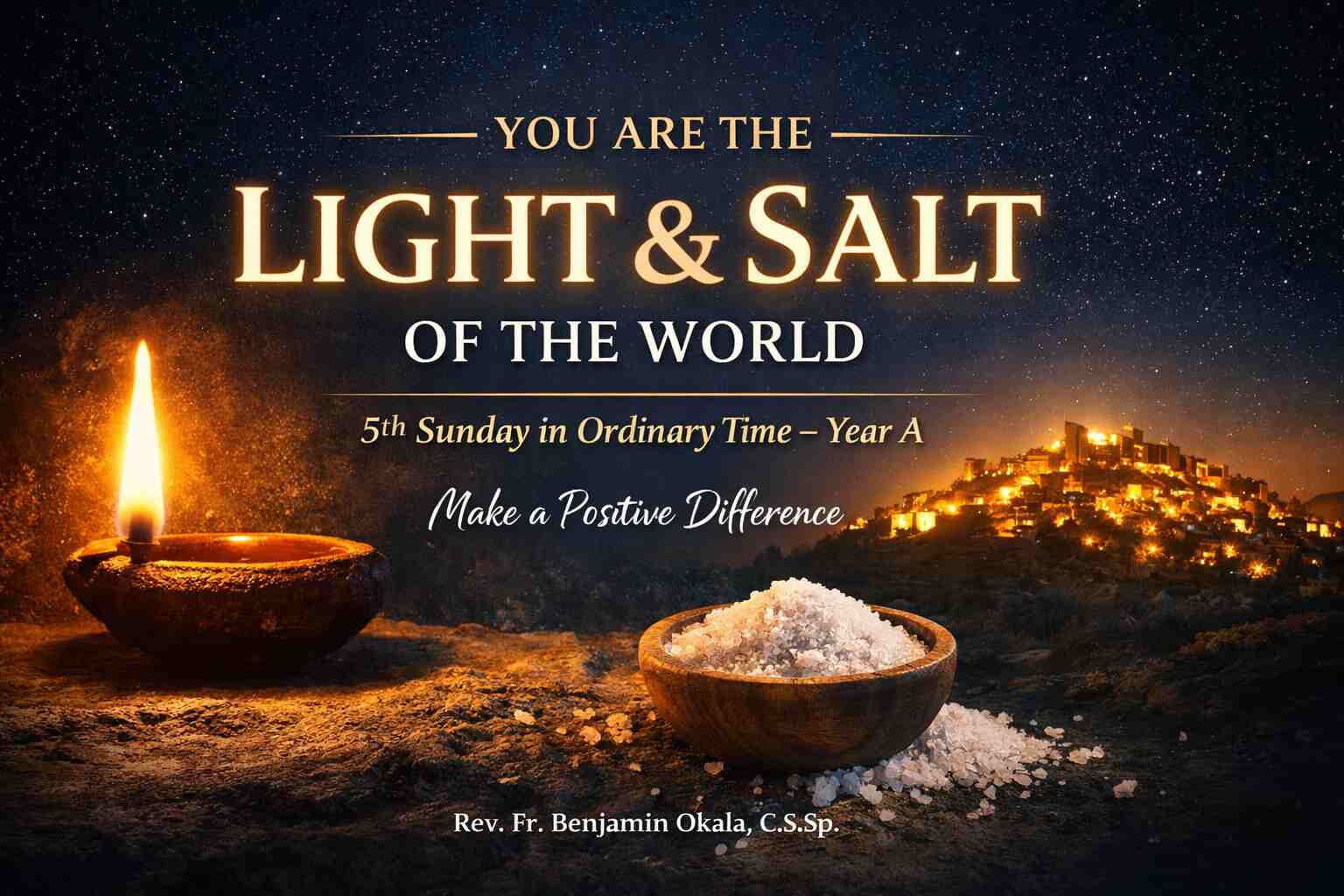HOMILY ON THE SIXTH SUNDAY IN ORDINARY TIME, YEAR A
Sirach 15:15-20; Psalm 118:1-2.4-517–18.33–34; 1 Corinthians 2:6-10 and Matthew 5:17–37
Introduction
“Do not imagine that I have come to abolish the Law or the Prophets. I have come not to abolish them but to complete them.” With the above assertion, Jesus Christ goes ahead in the Gospel Reading of this Sunday, Mat. 5:17–37, to teach us the moral ideal. This will guide us to a new and better understanding of the law.Continue Reading...
Straightaway, Jesus begins his discourse by stressing that, unless his disciples’ virtue grows deeper than the Scribes and the Pharisees, they will never enter the kingdom of heaven. Wow! This is a call to strive for a higher moral ideal beyond the ordinary. In other words, as Mahatma Gandhi puts it, we must endeavour to be the change we wish to see in others. With this clarion call to higher moral ideals, Jesus goes ahead in his teaching to discuss the issues of murder, adultery, divorce, and oath-taking, which were as morally burning issues of his time as they also are in our world today. Discussing the issue of murder, Jesus highlights the evil of committing murder and goes further to warn against what would lead to murder, which is the harboring of anger or hatred in the heart. This is because when the emotion of anger or hatred is not well processed, it will either lead to verbal violence, perjury, or physical violence and eventual killing. The remedy remains dialogue, reconciliation, and forgiveness, which, for Jesus Christ, must precede every one of our prayers and offertory before God. Many a time, we harbor or suppress a lot of hatred and grudges against others in our hearts. We even remain indifferent to those who have genuine complaints against us, while at the same time, we claim to love God and to be in a good relationship with God. Jesus enjoins us today to remedy the situation by having an open-minded dialogue with the person involved before continuing our daily prayers and sacrifices before God. On the sin of adultery, Jesus warns against loving sight and thinking, which lead to loving desires in the human heart, which eventually lead to the sin of adultery. Here, the human heart nurses within what the eye takes in. In other words, lustful sight leads to lustful desires or acts. This aligns with St. Thomas Aquinas’ age-long teaching that “Nothing enters into the human mind without passing through the senses.” This was exactly what led to the adultery of King David with Bathsheba, the wife of Uriah, the Hittite. David’s lust led to his sin of adultery (2 Kings 11:2–5). Again, this is why pornography is morally harmful. It blurs the spiritual power of the mind and heart and eventually leads the individual to sexual gratifications such as fornication, masturbation, compensation, and the like. Hence, for Jesus, adultery/fornication does not just happen, it is first nursed in the heart through lust. We should, therefore, not only strive to free ourselves from all occasions that pave the way to sexual sins and the like but also to block those avenues. On the issue of divorce, Jesus was quite definitive in his legislation: “Everyone who divorces his wife forces her to commit adultery, and the man who marries a divorced woman likewise commits adultery” (Matt. 5:32). Of course, Jesus is not ignorant of the possible marital and family issues that could threaten married life. However, Christ still insists that spouses should not give up on themselves but keep loving each other. This is due to the fact that a Christian marriage is the union of two good forgivers. Therefore, success in marriage is more than finding the right person. It is rather an ongoing effort by each spouse towards becoming the right person through love. This love expresses itself in consideration, dialogue, sacrifice, caring, and forgiveness. Finally, on the issue of oath-taking or swearing, Jesus tells us that we should not swear at all. He says that all we need to say is yes if we mean ‘Yes’, or ‘No’ if we mean no. According to Jesus, we shouldn’t need to take oaths to prove our righteousness. In life, we just need to be honest with ourselves as well as with others. To be honest, to stand by ‘Yes’ when ‘Yes’ Reflection by: Rev. Fr. Damian Ikemefuna Ozokwere, C.S.Sp.Striving for a Higher Moral Ideal
Moral Issues Discussed
Murder and Anger
Overcoming Hatred Through Dialogue
Dangers of Lust and Adultery
Moral Hazards of Lustful Desires
A Definitive Stance on Divorce
Conclusion
Honesty Over Oaths



